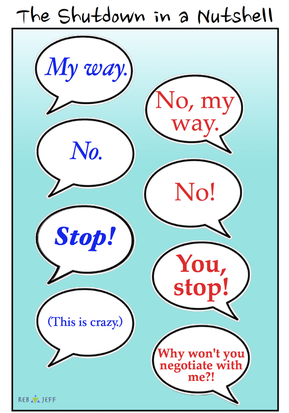 "The Hospitality of Abraham" 6th century mosaic, San Vitale, Italy
"The Hospitality of Abraham" 6th century mosaic, San Vitale, Italy How do you treat a perfect stranger? When someone you don’t know and have never met comes walking up to your door, how do you treat them? Do you approach them with polite but visible suspicion and say, “Yes? How can I help you? What is your business here?” Or, do you put on a cheerful smile and a warm demeanor — at least, for the moment — until you find out what they want?
In this week’s Torah portion, Vayera, Abraham went way beyond that approach in welcoming three men who came walking by his tent. When he saw them, Abraham begged them not to pass by until they had come into his home to share his hospitality. He called them “my lords,” and fetched water to wash their feet and to sooth their throats from their journey through the desert. He asked Sarah, his wife, to prepare food for them. Nothing was spared to make the strangers comfortable, even though Abraham did not even know their names.
As it turns out in the story, it was a good thing that Abraham treated them this way. The men were really angels sent from God with a message for Abraham about how his wife, the barren Sarah, would give birth to a child. But Abraham didn’t need to know that they were angels to treat them with the highest level of hospitality. He just treated them the same way he treated everyone — with genuine caring, compassion and decency.
Hospitality is an ancient Jewish value and it is a reflection of one of our most fundamental Jewish ideals. We are the people who taught the world that all human beings are created in the image of God. How, then, could we possibly turn away another human being, created in God's image, who came walking by our door? What could be so important to us that it would outweigh the need to show kindness and love to another person who is, like us, a reflection of the Divine?
So, think about it. What did you do the last time you encountered a stranger? Did you make that person feel welcome? Did you genuinely try to do everything you could to assure that person’s comfort? Did you see them as you might see yourself — a miracle of life and awareness in a world filled with wonders?
I don’t need to tell you that this is not the way that most people treat each other today. Maybe, it was never the way most people treated each other. However, it remains an ideal for us to keep in mind when we make our own choices about how to get along with the people we encounter in life. That is because — beyond being a polite or courteous way to behave — it is a way of living that makes life better for everyone. When we treat others with dignity and respect, we greatly increase the chances that we will be treated the same way. When we aim to create peace between people, our own lives are likely to become more peaceful.
Only, that’s not the way people usually see things in our society. We tend to be skeptical about calls for greater kindness and we are quick to label them as naïve or Pollyannaish. When we think about peace — in the Middle East, for example — we tend to think that resolution of conflict is more likely to come about if we are strong and able to intimidate than it is if we are kind and able to genuinely care about others. What a shame. Again, think about it. When has this been true in your own life? When have you been able to make a situation more genuinely peaceful because of your ability to intimidate or overpower others? When was the last time you found that happiness is achieved by not being kind to the people in your life?
So, forget about the Middle East when we ask the question, “Is peace possible?” Think instead about more immediate situations you face. When the technical support representative puts you on hold for a half hour, or when the teenager working the supermarket register miscalculates your change, think about creating some peace in your life in those moments. Think about the way that Abraham saw the image of God in the face of every stranger who walked by his door. Do you think you'll make yourself a sucker when you treat a person kindly in those situations? Or, rather, do you really do yourself a greater favor by not giving in to the temptation to get angry, upset and self-righteous?
Over the last two weeks, we saw the United States Congress cost the U.S. economy an estimated $24 billion just by refusing to treat each other with basic decency. Five hundred and thirty-five Senators and Representatives acted like a classroom of eight-year-olds who refused to play nicely with each other if they couldn’t get their own way. You may think, “Well, that’s just politics and politics is played a lot tougher than second grade.” But I don’t think so. I think it’s exactly the same.
Our leaders misbehave in this way as a reflection of a society that often forgets that genuine kindness to others is often the best way to serve your own interests. Aggressive, angry, self-righteous behavior may get the adrenaline pumping in our system, but it doesn't usually result in a better outcome for ourselves or the people around us.
When we don’t teach our children that it is more important to be kind than it is to get our way, we are not preparing them for success. We are preparing them for a life of bitterness and anger that gets worse every time they choose to treat another person harshly. It sets them up for failure every time they get put on hold for too long, when they get the wrong change, or when they can’t stop pouting until they get their way. We teach our children to be successful in life when we teach them to genuinely get along with others, and to practice sincere patience and forgiveness. We teach them to have happier lives when we encourage them to see each stranger as a being created in the image of God.
Three strangers came walking by Abraham’s tent, and he instantly treated them as the messengers from heaven that they truly were. It is not that Abraham had some weird, saintly ability to know the difference between angels and mortal men. It was much more simple than that. He had the insight to recognize that everyone you meet, every day, has a message for you that comes straight from God. However, you will only hear the message, and you will only be touched by miracles in life, if you are willing to see how the face of each stranger you meet reveals a little bit of God’s presence. When you do, you will know real happiness and you will know real peace.
Shabbat shalom.
Other Posts on This Topic:
Behar: Do Not Wrong One Another
Welcome to the Silly Season



 RSS Feed
RSS Feed
